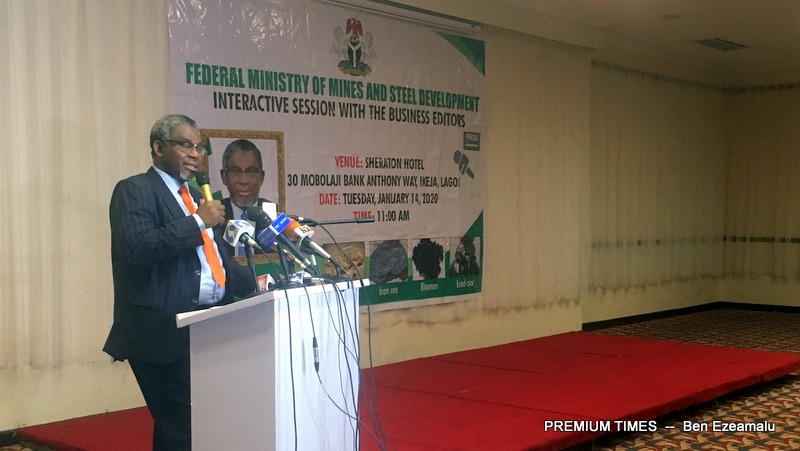The minister of Mines and Steel Development, Olamilekan Adegbite, has said that exploration of solid mineral must remain on the exclusive list in the Nigerian Constitution to enable the country maximise its benefits.
Mr Adegbite, an architect, spoke in Lagos Tuesday during an interactive session with journalists.
Items in the exclusive list in the Nigerian Constitution can only be legislated upon by the federal government while the states are allowed to make laws on those on the concurrent list.
Mr Adegbite said the federal government is reaching out to the states to create a win-win situation.
“With our focus on minerals, every governor is discovering that they have minerals in their domains and, of course, they want to corner that, to create revenues for themselves. We have been reaching to governors to say that it is safer and best to follow the constitution, allow the federal government to explore these minerals, just like they are exploiting oil and gas now.
“The money comes to the federation account and of course, is shared through FAAC. Also, there is now derivation in mining as well, whatever is found in your jurisdiction, you get 13 per cent of that value, just like in oil and gas, that is already happening and states are benefitting from this.
“So it’s an ongoing process, where we are trying to sensitise the governors to cooperate with us. Also, the federal government has allowed state governments to participate in mining through SPVs, not as governments but as corporate bodies. So state governments are encouraged to form corporate bodies, and there are quite a number of them now, in fact, almost every state now has a company through which they do mining.
“These corporate bodies can approach the ministry to get the requisite licence for exploration and of course to do mining. They could partner with other people and a few states are already doing that.”
The minister said the government has set up a committee to harmonise the positions of the various levels of government to ensure a cordial working relationship between them.
“It’s an ongoing, work-in-progress to get the federal government and state governments and even the local governments to work together,” he said.
“Because we don’t want investors coming into Nigeria, we give them licences from the ministry, when they get to the states where they are going to work they meet another set of barriers imposed by the state governments and often by the local government itself. This, of course, chases investors away.”
Mr Adegbite noted that Nigeria is losing millions in revenue because the downstream mining sector is not properly regulated.
“What we have is a lot of artisanal miners and, if I may say, a few illegal miners who go out there and mine and whatever they wean from the fold, they export in raw form. People are exporting iron ore, lead, tin, zinc and all that without any value added.
“So we are developing a downstream policy to encourage everybody, investors, to come in, to build beneficiation plants. If you mine gold, you don’t have to export it just like that, gold can be refined to its pure form and then you can sell in gold bars.”
He further said there is a presidential initiative where the Central Bank of Nigeria would be buying gold that is produced in Nigeria.
“This is, of course, very good for investors, miners because you have that option. You can either sell your gold to the CBN or take it abroad. But selling to the CBN is better for you because you are going to avoid the cost of transporting out of the country and they are going to buy at the international price. The CBN has agreed to keep about 10 per cent of the foreign reserve in gold.”
Mr Adegbite said his ministry has issued two refining licences, in Mowe (in Ogun State) and Abuja.
“They are both coming on stream very soon. They will refine the gold to the pure form, 99.99%, and of course to sell those gold bars anywhere in the world. This will help us in mitigating these illegal trades in our minerals. Right now, minerals are being exported out of this country without recourse to anybody. It is economic sabotage.
“You only have to pay a royalty which is five per cent maximum. And once you pay it, the ministry gives you an export permit which you can tender anywhere. This policy will crystallise before the first quarter. We are already in talks with customs and immigration in mitigating this illegality.





